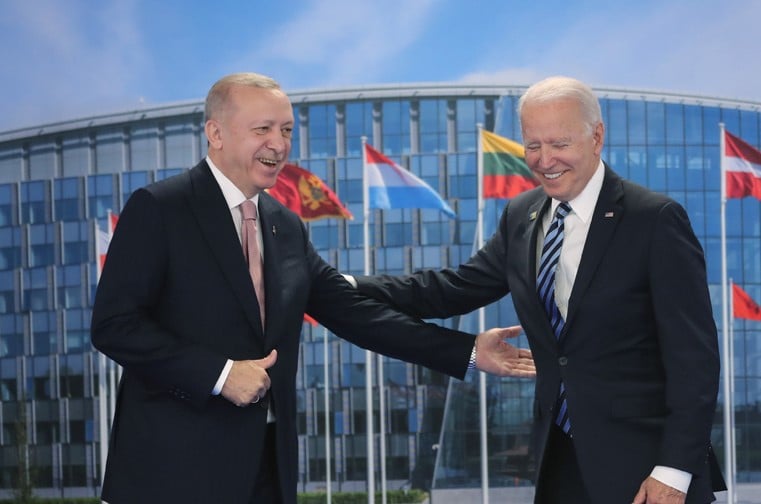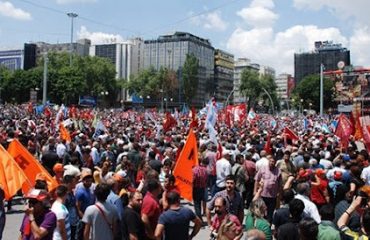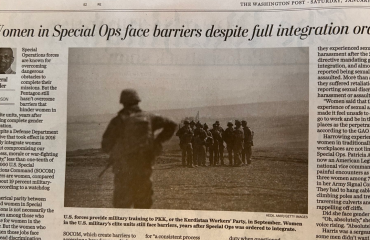

US President Joe Biden and Turkey’s President Tayyip Erdoğan talked for 45 minutes on the phone on March 10. A few hours before, Foreign Minister Mevlüt Çavuşoğlu had brought together the foreign ministers of Russia and Ukraine, Sergey Lavrov and Dimitro Kuleba, in Turkey’s resort city Antalya in Antalya Diplomacy Forum (ADF).
Biden’s schedule to call Erdoğan was announced on March 9, a day before that, while Israeli President Isaac Herzog was in Ankara. On the same day, Germany announced that their Chancellor Olaf Scholz would arrive in Turkey on March 14. Let’s not forget NATO Secretary-General Jens Stoltenberg’s “thanks” to Erdoğan. Is the US’s and Europe’s Turkey paradox now over, as just a few weeks ago, they were grumbling that Turkey had no place among them?
Did the Turkey contradiction of ABD and Europe, which just a few weeks ago grumbling that Turkey has no place among them, suddenly come to an end?
Did Turkey’s prominence on the diplomatic front of the Ukraine crisis eliminate the criticisms of the US and Europe towards Turkey? There is visible inconsistency.
Appreciation and sanction
Biden told Erdogan on the phone that he appreciated Turkey’s “efforts to support a diplomatic solution to the Russia-Ukraine conflict and (…) recent contacts with regional leaders”. Here, the plural suffix refers to the recent rapprochement with Israel and the United Arab Emirates (UAE). In addition, Antalya Diplomacy Forum (ADF) also brought together the Ministers of Foreign Affairs of Azerbaijan and Armenia; and the Turkish and Armenian Foreign Ministers have met for the first time in 13 years.
Emphasizing that the Antalya meeting of Russia and Ukraine is the victory of Turkish diplomacy, Erdogan told Biden that “it is the time to lift all unjust sanctions against Turkey on defence industry”.
Erdogan was right about this; It was interesting that the USA and Europe, which wanted to ban Turkey from selling SİHAs (UCAVs) until a few weeks ago, did not bring up the subject after Ukraine’s resistance wrote songs for Bayraktar TB-2. Moreover, the US removed Turkey from the F-35 program because Ankara bought the S-400 from Russia, and the USA had not yet responded to Turkey’s request to strengthen its air defence with the F-16 modernization. The USA was also blocking Turkey’s project to acquire NATO-compatible SAMP-T air defence systems from Europe.
The effect of the economic crisis on foreign policy
Public opinion in Turkey seems to be divided on these developments. Those who are illogically pro-US and pro-NATO defending the US moves saying “they are right because of S-400” now highlight how Erdogan turned to Israel after the “One minute” incident in Davos 2009. Opposite to hem, the shallowness that belittles the diplomacy efforts carried out by the Foreign Ministry as “elites” repeats the propaganda that the solution came solely by Erdogan’s phone call to Russian President Vladimir Putin.
One side is always trying to prove that what Erdogan did was wrong. The other side repeats that everything Erdogan does, even if it contradicts the previous ones, is the unchangeable truth. Both extremes do not want to see that countries do not have long-standing friends or arch-enemies but have varying interests.
Both do not want to see Erdogan’s foreign policy transition from a retailer’s (as defined by lter Turan) perspective of dealing with every specific case in its particular context to wholesale, or holistic, approach. This approach is closer to the traditional Turkish Foreign Policy perspective, if not a complete return. “Orthodox” traditional diplomacy has come to the fore rather than the back door channels.
The economic crisis that Turkey has been experiencing since 2018 following the previous US President Donald Trump’s words “I will destroy your economy” has a role in this transition.
Let’s elaborate on that a little.
Things don’t get better by fighting with the world
Especially after July 15 2016, coup attempt, Erdoğan was drawn to the “precious loneliness” line in foreign policy that has been valid since 2013. This line continued until the Covid-19 pandemic hit in 2020. When Erdogan’s insistence on keeping the policy rates low combined with the coronavirus epidemic, the currency crisis began to turn into a financial crisis and then into an economic crisis.
The foreign policy line with the “you’ll accept me as I am” motto had been at odds with the world. Then it started to change as the United States sought help from Turkey when it hurried out of Afghanistan. It was followed by Turkey’s UAE and Israel move. In addition, the Ukraine crisis showed Turkey’s capacity to do what Europe, especially the European Union, could not.
The meeting of Russia and Ukraine, which can be considered a diplomatic turning point in the conflict between the two largest countries of the disintegrated Soviet Union, was held in neighbouring NATO member Turkey.
The argument “there was no ceasefire” is weak; In a state of war, the expectation of reconciliation at the first meeting is not realistic anyway. Bringing the rival parties together is important itself
Benefit for Turkey, benefit for Erdogan
It is clear that recent developments have highlighted Turkey’s place in international politics. The closeness shown by the US and Europe to Turkey is naturally in line with their interests. Otherwise, from Osman Kavala to Selahattin Demirtaş, from the independence of the judiciary to the freedom of the press, nothing has changed on the front of rights and freedoms. However, time will tell whether there will be a change in the atmosphere for the rights and freedoms with the changing atmosphere of diplomacy, especially if Europe and the EU take a new approach.
Erdogan’s hope is that this rapprochement will rapidly change the foreign investment climate and help the AKP maintain its power on its way to the 2023 election. It looks more challenging.
Due to the Ukraine crisis, international financial institutions have started to lower their forecasts for the world economy, which was in a recovery trend after the Covid-19 crisis.
Will Western investments and Russian money withdrawn from Russia come to Turkey in this changing atmosphere? If it comes, will it immediately reflect on the welfare of the people and provide an improvement? Will it be permanent?
Moreover, will the double-standard and inconsistency of the West, the USA and Europe towards Turkey change due to its constructive role in this crisis?
None of these questions has yet been answered.


